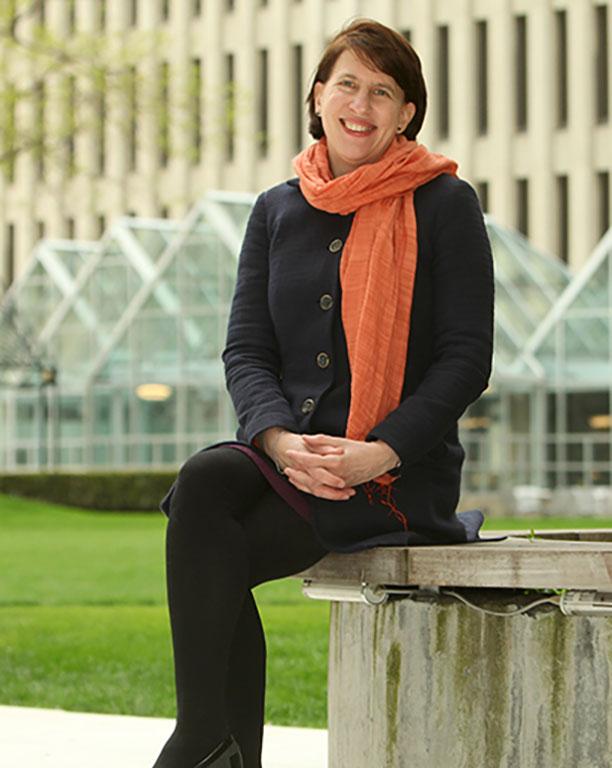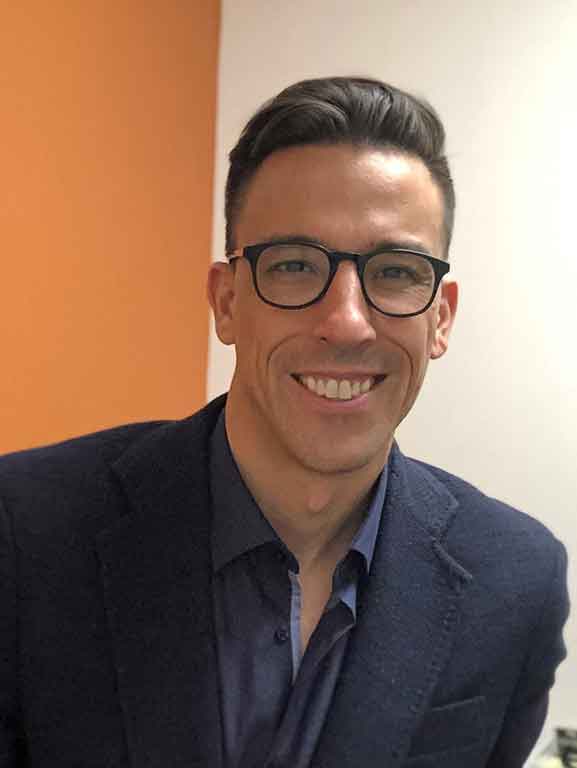“That richness of thought and perspectives really helps our work,” Jonathan Valenti, FCLC ’98, a principal with Deloitte Consulting, told Fordham College at Lincoln Center students in February.
Last fall, Fordham continued the conversation with students by hosting its first-ever Humanities Day, on September 19. “We all know that today, the humanities are under siege in virtually every university in this country,” Brenna Moore, Ph.D., a professor of theology, said at the event. “The logic seems to be we need a stripped down, efficient society. … Today we gather to push back on this pernicious logic.”
Moore is a member of the Fordham Humanities Consortium, which aims to “help our students flourish as they choose majors that seem increasingly countercultural.” The new group organized the Humanities Day gathering in partnership with Fordham’s Career Center. More than 100 students gathered in the McShane Campus Center at Rose Hill to hear from alumni and faculty about the value of studying philosophy, history, and other humanities fields.
In an article for The Chronicle of Higher Education, Martha C. Nussbaum, a professor in the philosophy department and the law school at the University of Chicago, described one of the less tangible benefits she observed while guest lecturing in a required philosophy course at Utah Valley University.
“What I saw was joy,” she wrote of the spirited debate that followed her lecture. “The sort of joy the philosopher Seneca described: not the flighty joy of the partygoer, but a solid inner joy that comes from discovering yourself.”
For Justin Foley, FCRH ’95, GABELLI ’03, who double majored in urban studies and philosophy, it was about learning to think creatively and being open to new paths, which is how he went from working as a tenant organizer to earning a Fordham M.B.A. to becoming a program organizer for the Service Employees International Union.
“Nobody said, ‘Here’s what your career track is going to be,’” he said. “I really learned to indulge my curiosity about the world around me. … My undergrad time has given me a framework for my values.”
—Franco Giacomarra, FCLC ’19, and Adam Kaufman, FCLC ’08
Why did you study the humanities, and what has the experience done for you personally and professionally? Tell us at [email protected].
]]>“That richness of thought and perspectives really helps our work,” said Jonathan Valenti, FCLC ’98, a principal in the customer and marketing strategy practice at Deloitte.
Valenti, who majored in information science, was one of three Fordham College at Lincoln Center (FCLC) grads who participated in a Feb. 9 virtual panel titled “From FCLC to the World of Business.”
Tracyann Williams, Ph.D., assistant dean for student support and success at FCLC, moderated the discussion. She asked the panelists to share their experiences as Lincoln Center students, their tips on taking liberal arts skills into the job market, and what they like about hiring applicants with that background.
Maureen Beshar, FCLC ’86, majored in philosophy and political science, and today she is executive director of business development for the investment management firm Hardman Johnston Global Advisors. She said her Fordham Jesuit education—with its focus on well-rounded learning and being a person for others—has been valuable in her personal and professional life.
“Fordham’s [Jesuit] foundation … I really think it makes a difference in a person,” said Beshar, whose two daughters both attend Fordham and who serves on the University’s President’s Council, a group of successful alumni committed to mentoring Fordham’s future leaders, funding key initiatives, and raising the University’s profile. “It really, ethically, helped me think differently. I can attribute a lot back to Fordham, with how I treat others, how I think about situations.”
Make the Most of ‘Internship City’
Scot Hoffman, FCLC ’98, majored in English and assumed he would pursue a career in academia. But a public affairs internship at the Fresh Air Fund, which Hoffman found through Fordham’s Career Center, resulted in him becoming the organization’s director of public affairs after he graduated. He has worked in the public affairs and corporate communications field ever since, specializing in building and managing corporate reputation. Today, he is vice president and director of communications at the San Francisco-based investment firm Dodge & Cox.
“Internships are really, really important,” Hoffman told students, adding that Fordham’s location is helpful in getting that experience. “Explore what’s available to you. New York City is one of the greatest cities in the world. So many industries are represented there, [and there are]so many opportunities there.”
Blending Business Education with the Liberal Arts
The alumni panelists were joined by Robert Daly, assistant dean of the Gabelli School of Business at Lincoln Center, who discussed the opportunities for FCLC students to study things like marketing, business administration, and sustainable business by taking classes or minoring at Gabelli. He also emphasized that Gabelli undergraduates complete a liberal arts core, an example of Fordham’s faith in the value of a liberal arts education, and that he often encourages Gabelli students to consider FCLC minors like psychology to complement their business majors.
Williams said that the panelists’ perspectives were “invaluable” in helping students “understand how you may move from the liberal arts into business—that it is not necessarily a linear path, but one that is exciting.”
]]>The process is something that Laura Auricchio, Ph.D., has on her radar, and in a March 7 Zoom meeting, Auricchio, the dean of Fordham College at Lincoln Center, discussed it with the FCLC Board of Advisors—a group of alumni and friends of the college that she reconvened last fall. The group met with Patricia Peek, Ph.D., dean of undergraduate admissions, and Rodger Van Allen, director of development for Fordham College at Lincoln Center, to talk about how they can show prospective students all Fordham has to offer.

The new board, which is similar to a student advisory group that also began meeting in the fall, is comprised of Maureen Beshar, FCLC ’86; Cathy Blaney, FCLC ’86; Jolie Ann Calella, FCLC ’91; Rick Calero, FCLC ’90; Patricia Dugan Perlmuth, FCLC ’79; Jonathan Valenti, FCLC ’98; and Mark Luis Villamar, GABELLI ’69.
The admissions meeting was just one of many ways this new group of FCLC supporters put their heads together to help the institution they love. This was their third gathering after two last semester—including a joint meeting with members of the new student group.
Raising the Profile
Auricchio revived the Board of Advisors with the hopes of both increasing alumni engagement and substantially raising the profile of the college, which she said is one of the best-kept secrets in New York City. Ask your average New Yorker about the Lincoln Center campus, and they may be familiar with the Law School, but not necessarily Fordham College at Lincoln Center, she said. One way to fix that is to establish a much more robust connection to New York City, and who better to help than a board of advisors, each with deep roots in the Big Apple?
“I fully believe that FCLC can become the premiere liberal arts college in Manhattan, and I think it can be unique in its focus on the arts, its integration in the city, and its commitment to Jesuit values of social justice and more,” she said.
Valenti, a native of Poland, Maine, who visited both the Lincoln Center and Rose Hill campuses as a high school senior, said he was smitten immediately with the idea of living in Manhattan and seeing all of New York as his campus. He said he loves the University’s motto, “New York is my campus, Fordham is my school.”
“My family thought I was crazy. When we went to Rose Hill, they were like, ‘Isn’t this where you want to go?’ I said ‘nope,’” he recalled, laughing.
When he was an undergraduate, he majored in informational systems; now a partner at Deloitte, he said he’s eager to give back. He’s already hosted a gathering of prospective students at the company’s Manhattan headquarters at 30 Rock and wants to do more.
A New Opportunity to Connect

“Fordham gave me a great educational foundation for the work I do,” he said, noting that he was prepared for the convergence of business and technology that has happened in the years since. The advisory board, he said, has given him a new opportunity to connect with others who feel the same way.
“It’s been exciting to be part of a discussion with other alums who have been out there and seen the value of the education and have pride in the school.”
Valenti said he’s especially interested in helping create programs that take advantage of expertise in different disciplines, like combining the arts with law and business. The conversation about admitted students was a good place to start, he said, and gave him hope for future meetings.
“There is a hunger for more of the data that was shared by the admissions side. We’re looking to understand where the students are coming from, and why they’re choosing Fordham,” he said.
“People do question the value of a liberal arts education, and the way we function at work is changing and evolving, and so Fordham has a chance to be setting that agenda.”
Auricchio said that although the first meetings—there is one more left this semester—have primarily been focused on getting the group off the ground, it’s key to her that the group is action- and goal-oriented. Participants at the March 7 meeting made it clear they feel the same.
“I don’t want to waste anybody’s time. I want to find ways to build connections through the whole student pipeline, from the time when students apply, to when they meet alumni, through the time that they’re students, through their alumni experience after they graduate,” she said.
“I see this as a virtuous cycle. If we start engaging them as students, while they’re students, they develop stronger connections to the college, and to each other.”
]]>